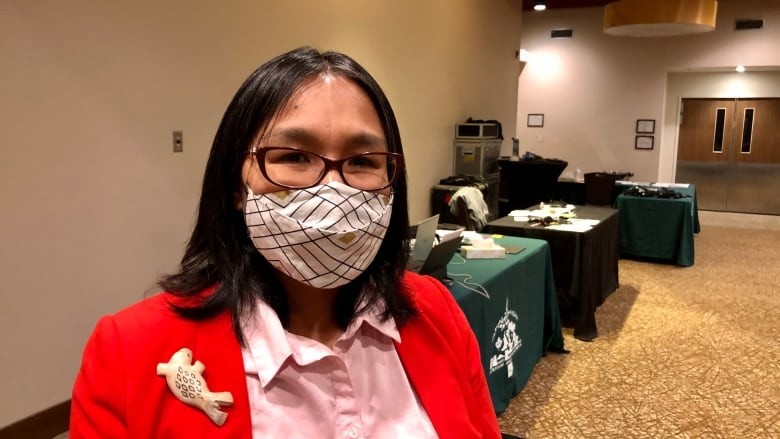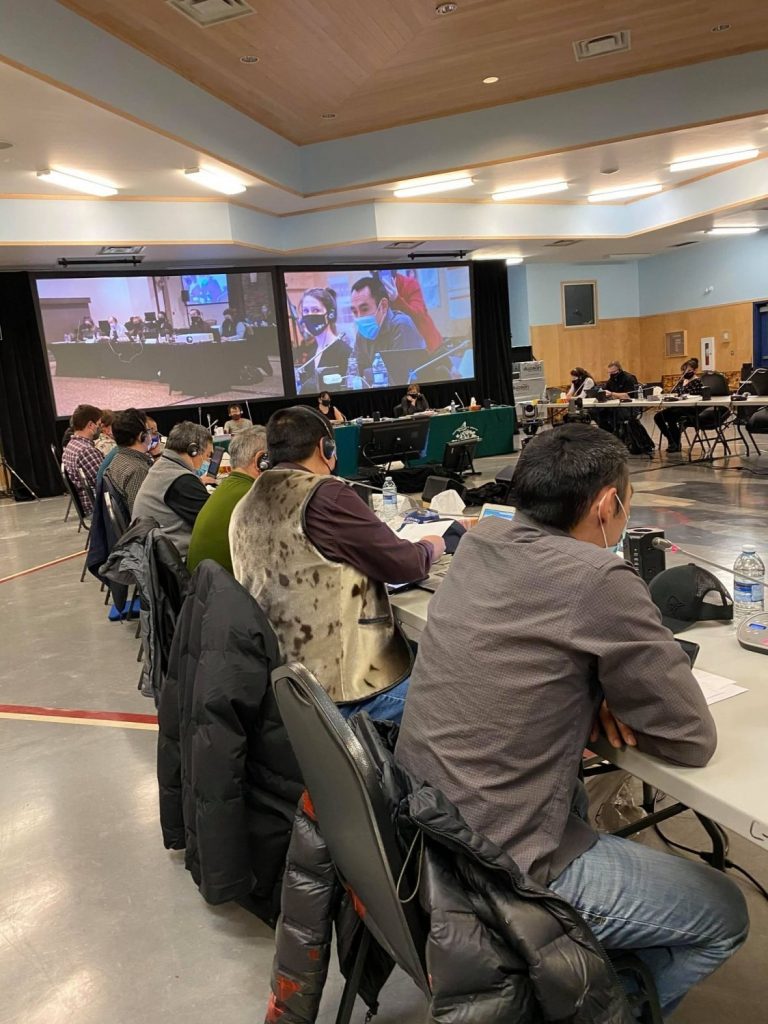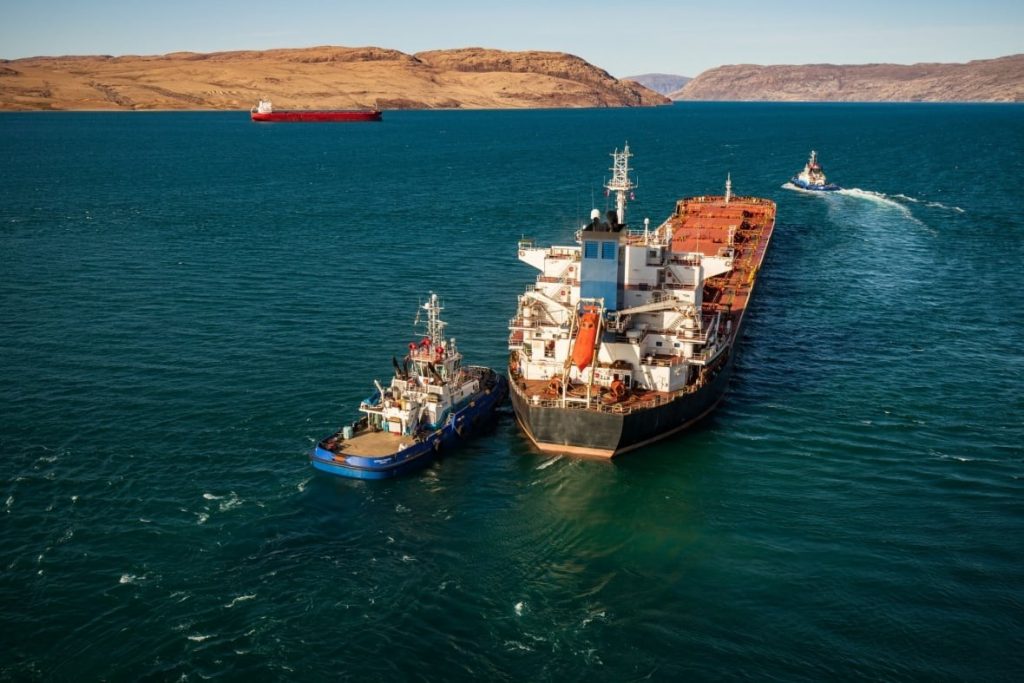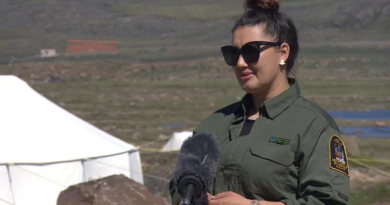Participants at Nunavut mine hearing question whether process is serving Inuit

Tensions continue between Baffinland and Inuit leaders at an expansion hearing for the Mary River mine, but yesterday it was the organization running the technical hearing that participants were frustrated with.
As the hearing agenda falls behind — on Friday morning participants were still working through Monday’s scheduled presentations — the Nunavut Impact Review board has begun restricting the number of questions each party can ask for Baffinland, per presentation.
Now community representatives from hamlets and hunters and trappers organizations are saying for the hearing record that the process is not supporting Inuit interests.
“NIRB has stated on a few occasions that they are limiting questions to interveners in the interest of time. I implore you to put more weight on the interests of Inuit,” said Lori Idlout, technical advisor for the Ikajutit Hunters and Trappers Organization in Arctic Bay, on Thursday.
“The image in my mind is that NIRB is using Baffinland’s bulldozer to complete the hearings as quickly as possible,” she said.
Pond Inlet’s hunters and trappers organization criticized participating governments for not having more questions.
“This project deserves and needs more work, and more attention, and that is what we bring to the table. More questions, not less, are absolutely necessary,” Eric Ootoovak, chairperson for the Mittimatalik Hunters and Trappers Association, told the board.
“Instead of developing more questions based on what we’ve heard, our technical advisor has spent two days trying to find ways to cut corners and limit our incredibly important questions.”
This process is not giving us enough time to speak.– Eric Ootoovak, chairperson, Mittimatalik Hunters and Trappers Organization
Igloolik’s mayor, Merlyn Recinos, called it “unacceptable” and “insulting” to restrict a process that fulfils Canada’s duty to consult with Inuit.
“Procedural fairness to Inuit communities and Inuit participants during this proceeding has not been given,” he said.
Recinos acknowledged that some questions may sound repetitive, as numerous technical meetings and hearings have been held for the expansion review over the last few years.
Review board says it’s saving time for community voices
This technical hearing is meant to review any outstanding concerns regarding a proposal to increase production at the iron ore mine on north Baffin Island from six million tonnes to 12 million tonnes annually.
The project includes building a railway to replace a current trucking road used to transport iron ore, and significantly increase the number of ore carriers used to ship the product out of Milne Inlet.
The small inlet opens into Eclipse Sound, a primary summering area for Nunavut’s largest population of narwhal. After years of negotiations, communities say they still haven’t been given a clear picture of how the mine will impact Inuit land use and hunting rights for themselves and following generations.

“This process is not giving us enough time to speak,” said Ootoovak.
The Nunavut Impact Review Board says using time wisely will allow more Inuit voices to be heard next week during a five-and-a-half-day community round table discussion.
In its mandate, the Nunavut Impact review Board calls itself an “institution of public government created by the Nunavut Agreement to assess potential impacts of proposed development in the Nunavut settlement area.”
The NIRB makes recommendations to the minister of Northern Affairs. The Government of Canada will have the final say on whether or not to approve the project.
Hamlets and hunters groups have yet to give their presentations and share evidence from their own environmental experts.
Clarity needed on mine’s use of Inuit knowledge, hunters say
Idlout, the technical advisor with Arctic Bay’s hunters and trappers, said until communities start getting real answers, there will continue to be delays.
She said Inuit are already deeply feeling the changes to caribou, whale and char populations from current mining.
“When Baffinland is asked about those changes they are saying that they are not significant, that they have been predicted. And yet, they aren’t providing real answers about how deep those impacts are, and so there’s a mistrust,” Idlout said.
As well, she says intervenor groups still don’t know how the mine is using Inuit Qaujimajatuqangit, or traditional knowledge, to decide that doubling production can be done sustainably.
Inuit need to clearly see how, or through what methods, the mine is incorporating Inuit Qaujimajatuqangit to make sure it is being used right, Idlout said.
In response to a question about the use of traditional knowledge from Pond Inlet Mayor Joshua Arreak, Baffinland’s vice president of sustainable development, Megan Lord-Hoyle, said the mine doesn’t believe it is appropriate to create a formula for using Inuit Knowledge, but said community feedback is crucial to how the project is being planned.
Baffinland says it is using information from hundreds of community meetings to plan the expansion. Changes to the railway, made using community input, have meant that over 60 per cent of the rail line will be crossable by caribou, the mine said.
The company does have its own mandate to include Inuit Knowledge in current and future work.
“Baffinland views Inuit Qaujimanituqangit as central to the successful planning and operations of the Mary River Mine,” the mine states in an Inuit Qaujimanituqangit Management Framework filed with the NIRB registry.
“IQ (Inuit knowledge) captures knowledge of relationships and morality, core values and worldviews, as well as, environmental knowledge,” the document states.

The framework is a living document and will be updated based on outcomes and commitments from the current hearing, and from the Inuit Certainty Agreement (ICA), Baffinland spokesperson Heather Smiles said in an email.
That’s a benefit agreement negotiated between Baffinland and the Qikiqtani Inuit Association since a previous final hearing was adjourned, unfinished, in November 2019.
Baffinland and the QIA created the agreement in the hopes of addressing outstanding concerns. The mine says it represents over $1 billion in benefits for Inuit over the lifespan of the mine.
But the Mittimatalik Hunters and Trappers Organization says the agreement doesn’t address the future health of narwhal and seal. Only part of the agreement is entered on the hearing record.
“Much work remains before we know whether it will address Inuit concerns, so therefore it is wrong for Baffinland to consider the ICA at this point, especially only those parts that support Baffinland’s world view,” said Ootoovak, the organization’s chair.
The MHTO filed a motion with the board to include all of the agreement in the documents being considered by the hearings, or to strike it from the record.
Related stories from around the North:
Canada: Arctic iron mine expansion hearings open to opposition from Nunavut communities, CBC News
Greenland/Denmark: Greenland and Denmark finalize cooperation agreement on marine pollution response, Eye on the Arctic
Finland: Miners hunting for metals to battery cars threaten Finland’s Sámi reindeer herders’ homeland, Yle News
Norway: Climate change hits back at Svalbard, coal mine flooded by melting glacier in Norway, The Independent Barents Observer
United States: Conservation groups sue government over Alaska mining road, The Associated Press


